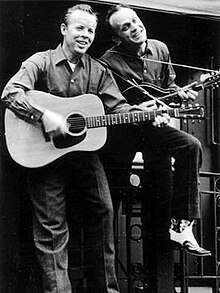Louvin Brothers
| The Louvin Brothers | |
|---|---|

Charlie (left) and Ira Louvin
|
|
| Background information | |
| Origin | Alabama, U.S. |
| Genres | Country, gospel |
| Years active | July 4, 1940 – August 18, 1963 |
| Labels | Capitol |
| Members |
Ira Louvin Charlie Louvin |
The Louvin Brothers were an American musical duo composed of brothers Ira Lonnie Loudermilk (1924–1965) and Charlie Elzer Loudermilk (1927–2011), better known as Ira and Charlie Louvin. The brothers are cousins to John D. Loudermilk, a Nashville Songwriters Hall of Fame member.
The brothers wrote and performed secular country music, as well as fire and brimstone Gospel music. Ira played virtuoso mandolin and generally sang lead vocal in the tenor range, while Charlie played rhythm guitar and offered supporting vocals in a lower pitch. They helped popularize the vocal technique of close harmony in country and country-rock.
After becoming regulars at the Grand Ole Opry and scoring a string of hit singles in the late 1950s and early '60s, the Louvin Brothers broke up in 1963 due in large part to Charlie growing tired of Ira's addictions and reckless behavior. Ira died in a traffic accident in 1965. They were inducted into the Country Music Hall of Fame in 2001, and Charlie died of cancer in 2011.
The brothers adopted the name Louvin Brothers in the 1940s as they began their career in gospel music. Their first foray into secular music was the minor hit "The Get Acquainted Waltz", recorded with Chet Atkins. Other hits included "Cash on the Barrelhead" and "When I Stop Dreaming". They joined the Grand Ole Opry in 1955 and stayed there until breaking up in 1963.
Their songs were heavily influenced by their Baptist faith and warned against sin. Nevertheless, Ira Louvin was notorious for his drinking, womanizing, and volcanic temper. He was married four times; his third wife Faye shot him four times in the chest and twice in the hand after he allegedly tried to strangle her with a telephone cord Although seriously injured, he survived. (Faye is reported to have said, "if the bastard don't die I'll shoot him again!"). When performing and drinking, Ira would sometimes become angry enough on stage to smash his mandolin when he was unable to tune it, and - when sober - glue it back together. His style was heavily influenced by Bill Monroe, and his brother Charlie, who had a tempestuous relationship with Ira, considered him one of the top mandolin players in Nashville
...
Wikipedia
